Imagine this: you’re a 35-year-old professional living in a bustling Indian city. You’re juggling deadlines, managing family responsibilities, and navigating the daily commute. That persistent fatigue? You blame it on work stress. The occasional acidity? Probably last night’s dinner. We often become experts at explaining away our body’s subtle signals, pushing the thought of a proper health check to a distant “someday.” But in a country where we meticulously plan our finances and investments, are we overlooking our most valuable asset—our health?
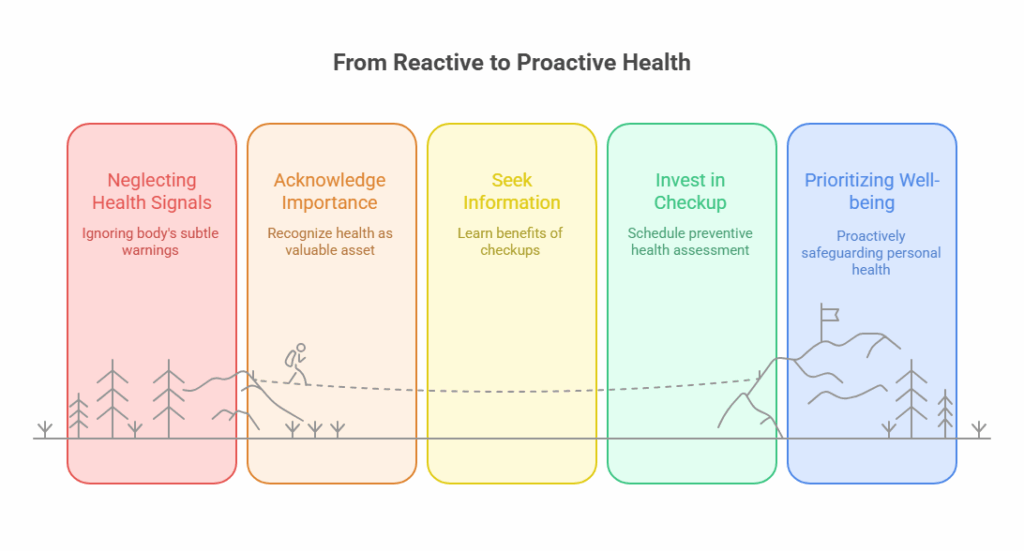
This brings us to a critical question many Indians ask: is a full body checkup a necessary investment or an avoidable expense? At Health Care On Time, we believe in empowering you with data-backed information. This comprehensive guide will transparently explore the real value, costs, and benefits of a preventive health checkup in India, helping you shift from a reactive mindset of curing illness to a proactive one of safeguarding your well-being.
The Alarming Reality: Why India Needs a Preventive Health Revolution
Traditionally, we visit a doctor only when we are sick. However, the health landscape in India is undergoing a dramatic and concerning shift. We are now facing a silent epidemic of non-communicable diseases (NCDs) or lifestyle diseases. These are conditions that develop over time due to factors like diet, stress, lack of physical activity, and genetics.
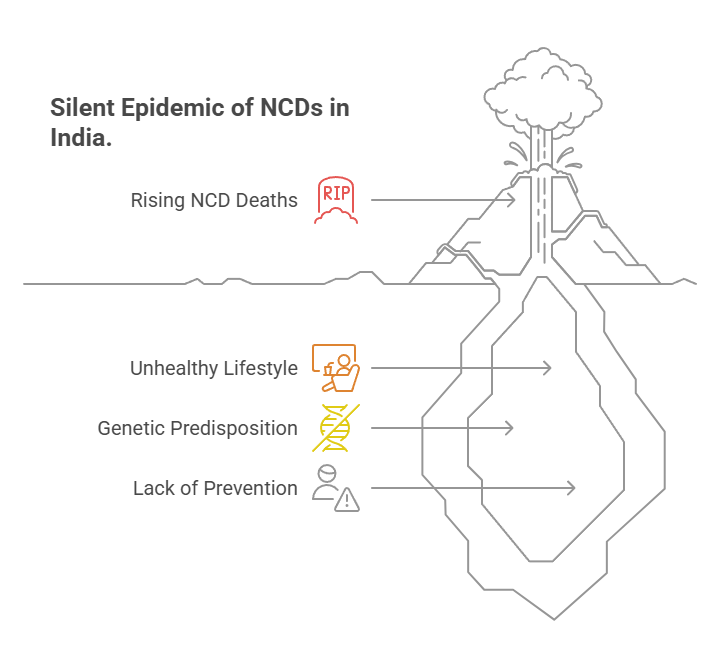
The numbers are staggering. A report from the Indian Council of Medical Research (ICMR) stated that the contribution of NCDs to total deaths in India surged from 37.9% in 1990 to a shocking 61.8% in 2016. Conditions like heart disease, diabetes, hypertension, and certain cancers are no longer just “old age” problems; they are increasingly affecting younger Indians.
This is where a preventive health checkup becomes your most powerful defense. Think of a full body checkup as an early warning system. It’s not for when you’re already ill; it’s a proactive measure to catch potential health issues at their very earliest stages when they are far easier and more affordable to manage or even reverse. Embracing this proactive approach is crucial for a healthier future.
What Tests Are Included in a Full Body Checkup? A Comprehensive Guide
One of the biggest questions people have is, “What exactly am I being tested for?” While the components of health checkup packages can vary, a truly comprehensive full body checkup will assess the health of your vital organs and screen for common lifestyle diseases.
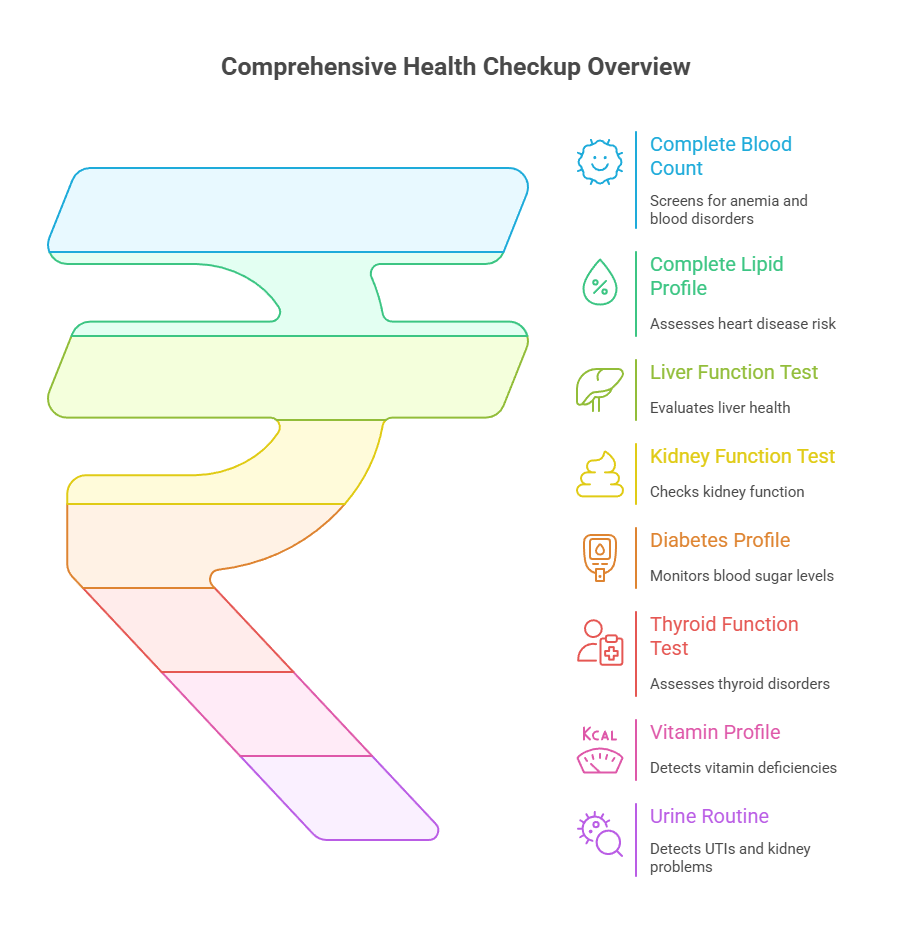
Below is a detailed breakdown of the most critical tests and why they are particularly important for the Indian population. This table helps you understand the purpose behind each test in a good preventive health checkup.
| Test Parameter | Specific Tests Included | Why It’s Vitally Important in the Indian Context | Indicative Normal Range |
| Complete Blood Count (CBC) | Hemoglobin, RBC, WBC count, Platelets | Screens for anemia (highly prevalent in Indian women), infections, and other blood disorders. | Hemoglobin: 13.5-17.5 g/dL (M), 12.0-15.5 g/dL (F) |
| Complete Lipid Profile | Total Cholesterol, Triglycerides, HDL, LDL, VLDL | Heart disease is the leading cause of death in India. This panel assesses the risk of arterial blockages. | Total Cholesterol: <200 mg/dL; LDL: <100 mg/dL |
| Liver Function Test (LFT) | SGPT (ALT), SGOT (AST), Bilirubin, Albumin | Crucial for assessing liver health, especially with rising cases of fatty liver disease due to diet and alcohol. | SGPT: < 41 U/L; SGOT: < 40 U/L |
| Kidney Function Test (KFT) | Serum Creatinine, Blood Urea, Uric Acid | Checks kidney function, essential for individuals with diabetes, hypertension, or a family history of kidney disease. | Serum Creatinine: 0.7-1.3 mg/dL |
| Diabetes Profile | Fasting Blood Sugar (FBS) & HbA1c | India is often called the ‘diabetes capital’. HbA1c provides a 3-month average of blood sugar control and is the gold standard for screening. | HbA1c: Below 5.7% |
| Thyroid Function Test | TSH (Thyroid Stimulating Hormone), T3, T4 | Thyroid disorders, particularly hypothyroidism, are extremely common in India, affecting metabolism and energy levels. | TSH: 0.5 – 5.0 mIU/L |
| Vitamin Profile | Vitamin D, Vitamin B12 | Studies show widespread deficiency of these crucial vitamins in the Indian population, leading to fatigue, bone pain, and nerve issues. | Vitamin D: 30-100 ng/mL |
| Urine Routine (R/M) | Color, Appearance, Glucose, Protein, Ketones | A basic but powerful test to detect urinary tract infections (UTIs), kidney problems, and signs of uncontrolled diabetes. | Glucose/Protein: Negative |
Understanding this list answers the crucial question of “what tests are included in a full body checkup” and empowers you to choose the right package for your needs.
Decoding the Full Body Checkup Price in India: An Honest Breakdown
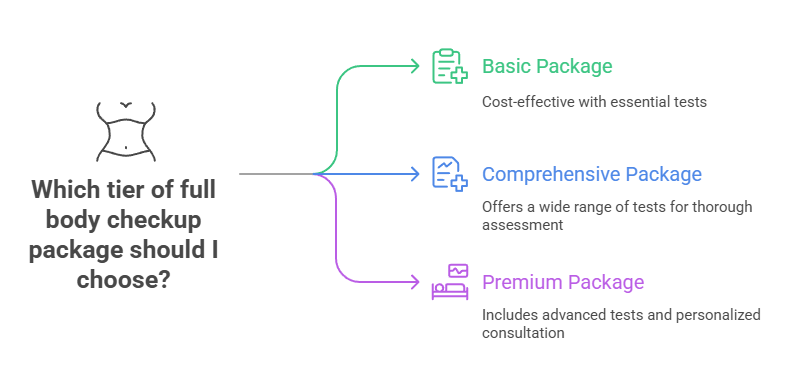
Let’s address the most practical question: how much does a full body checkup cost? The price can vary significantly based on the city you’re in, the reputation of the diagnostic lab, and, most importantly, the number of tests included in the package. A full body checkup price in a metro city like Mumbai or Delhi might be slightly higher than in a Tier-2 city.
To make it simpler, we can categorize the full body checkup cost in India into three main tiers:
Tier 1: Basic Health Checkup Packages
These are entry-level packages perfect for individuals under 30 with no specific health complaints or family history of disease. They provide a good baseline of your health.
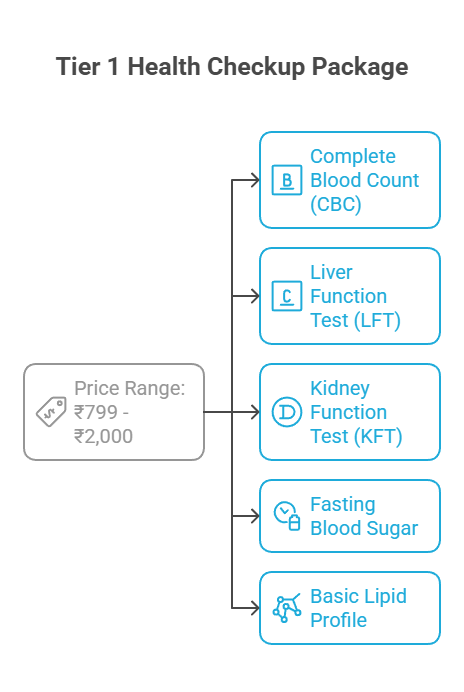
- Price Range: ₹799 – ₹2,000
- Typical Tests Included: Complete Blood Count (CBC), Liver Function Test (LFT), Kidney Function Test (KFT), Fasting Blood Sugar, and a basic Lipid Profile.
Tier 2: Comprehensive Health Checkup Packages
This is the most popular category and is highly recommended for anyone over 35 or those with a hectic lifestyle. These packages offer a much more detailed picture of your health.
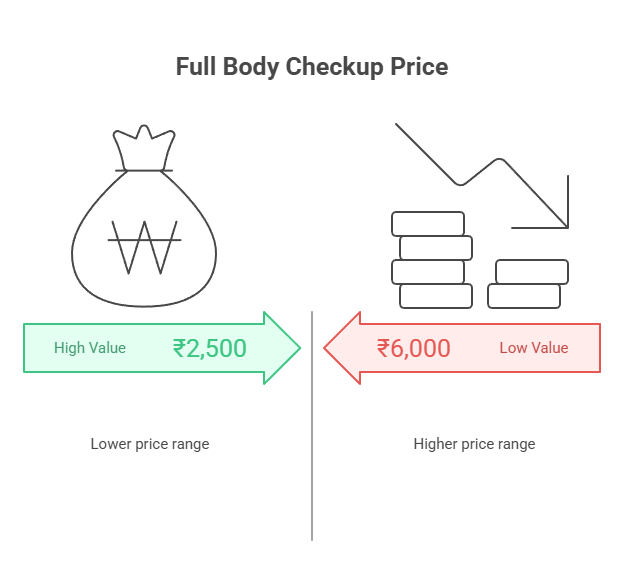
- Price Range: ₹2,500 – ₹6,000
- Typical Tests Included: Everything in the Basic package, plus an advanced Lipid Profile, HbA1c (for diabetes), a complete Thyroid Profile (T3, T4, TSH), Vitamin D and B12 levels, Urine Routine, and often an ECG (Electrocardiogram) to check heart rhythm. The full body checkup price in this range offers the best value for money.
Tier 3: Premium/Advanced Packages
These packages are designed for individuals over 50 or those with specific risk factors. They include a battery of tests, often including imaging and scans.
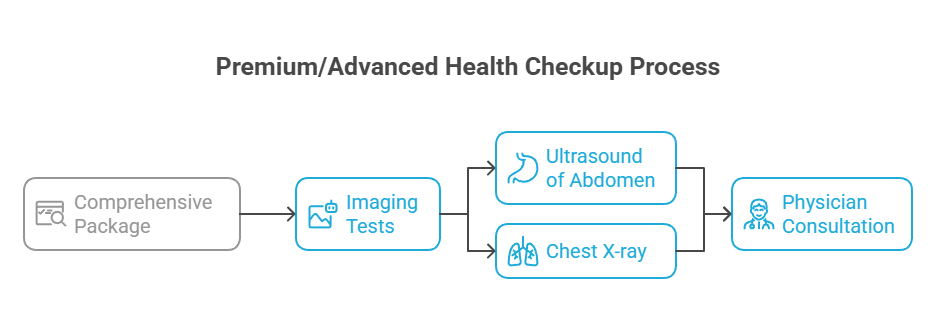
- Price Range: ₹8,000 and above
- Typical Tests Included: All tests from the Comprehensive package, plus imaging tests like an Ultrasound of the abdomen, Chest X-ray, and consultations with physicians.
When comparing health checkup packages, don’t just look at the number of tests. Focus on the quality and relevance of the tests offered. The ultimate full body checkup cost in India should be seen as an investment, not an expense.
The Smart Saver’s Secret: Maximizing Your Section 80D Health Checkup Benefit
Here’s a piece of information that makes a preventive health checkup even more valuable. The Government of India actively encourages citizens to take proactive care of their health by offering a tax benefit.
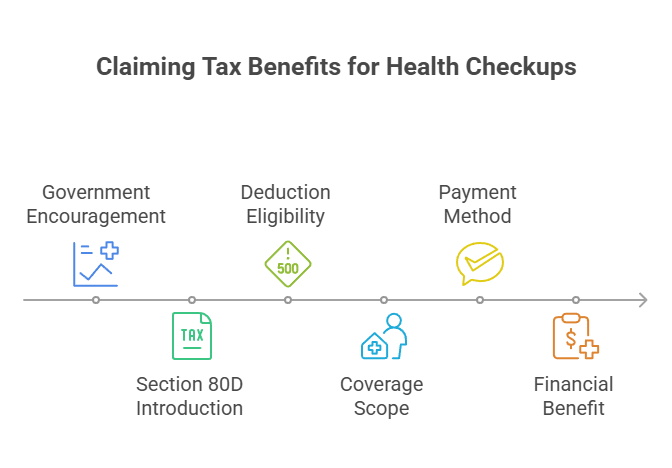
Under Section 80D of the Income Tax Act, you can claim a deduction of up to ₹5,000 per financial year for the amount spent on a preventive health checkup. This deduction covers checkups for yourself, your spouse, your dependent children, and your parents.
This benefit is part of the overall limit of Section 80D (₹25,000 for self and family, and an additional limit for parents). By availing this, you effectively lower the net full body checkup cost, making it a financially wise decision. Remember to make the payment through a mode other than cash to be eligible for this Section 80D health checkup benefit.
A Personalized Approach: The Right Checkup at the Right Age
A one-size-fits-all approach doesn’t work for healthcare. The ideal full body checkup is one that is tailored to your age, gender, lifestyle, and family medical history. Here’s a general guideline recommended by Health Care On Time.
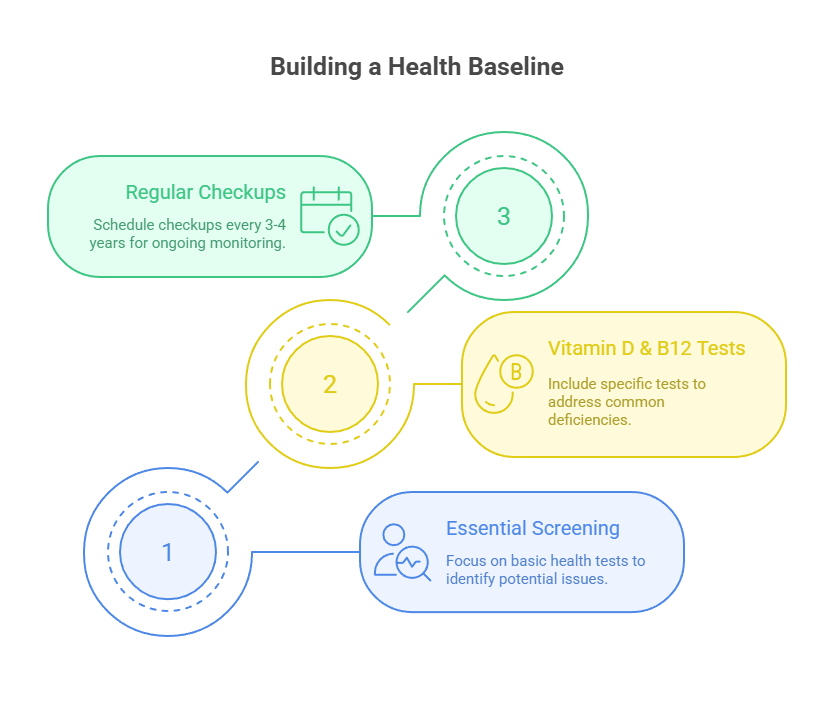
In Your 20s and Early 30s: Building a Baseline
This is the decade to establish your health baseline. The goal is to get a snapshot of your current health status which can serve as a reference point for the future.
- Focus: Essential screening and creating a health record.
- Recommended Checkup: A Basic Health Checkup package is usually sufficient. It’s wise to include Vitamin D and B12 tests, given the high prevalence of their deficiencies.
- Frequency: Once every 3 to 4 years, provided you have no specific health issues.
In Your Late 30s and 40s: The Proactive Phase
This is when the impact of lifestyle choices, stress, and genetics begins to show. It’s a critical period for the early detection of lifestyle diseases.
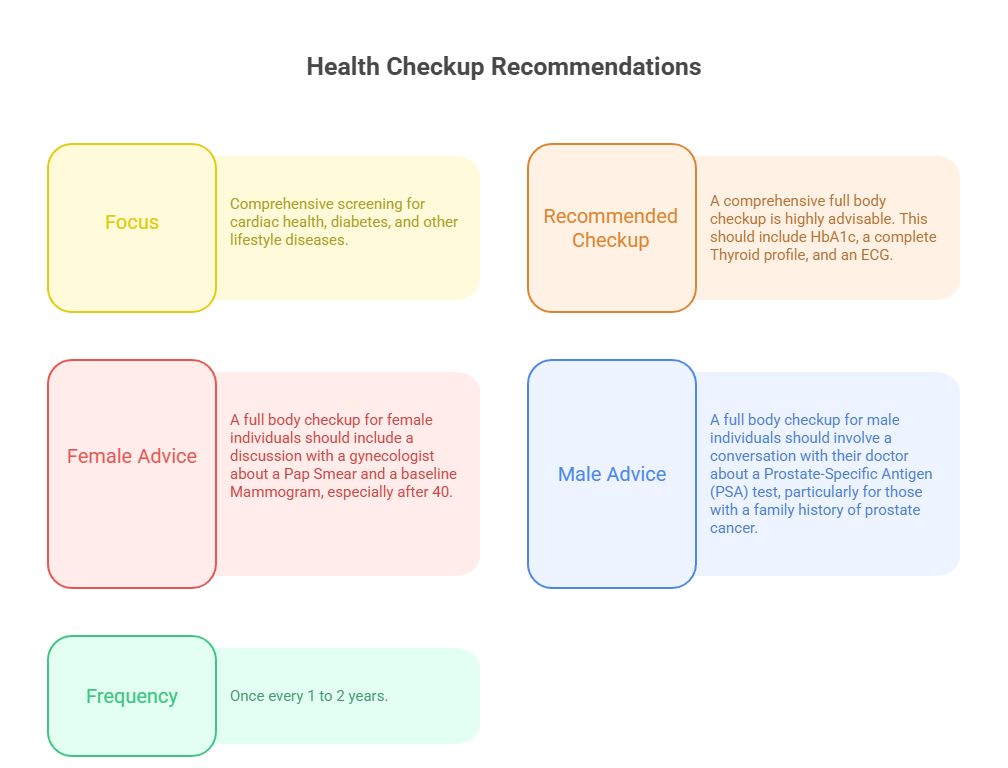
- Focus: Comprehensive screening for cardiac health, diabetes, and other lifestyle diseases.
- Recommended Checkup: A Comprehensive full body checkup is highly advisable. This should include HbA1c, a complete Thyroid profile, and an ECG.
- Gender-Specific Advice:
- A full body checkup for female individuals in this age group should include a discussion with a gynecologist about a Pap Smear (for cervical cancer) and a baseline Mammogram (for breast cancer), especially after 40.
- A full body checkup for male individuals should involve a conversation with their doctor about a Prostate-Specific Antigen (PSA) test, particularly for those with a family history of prostate cancer.
- Frequency: Once every 1 to 2 years.
In Your 50s and Beyond: Comprehensive Monitoring
Health becomes a top priority in these years. A regular and more extensive full body checkup is essential for monitoring age-related conditions and maintaining organ health.
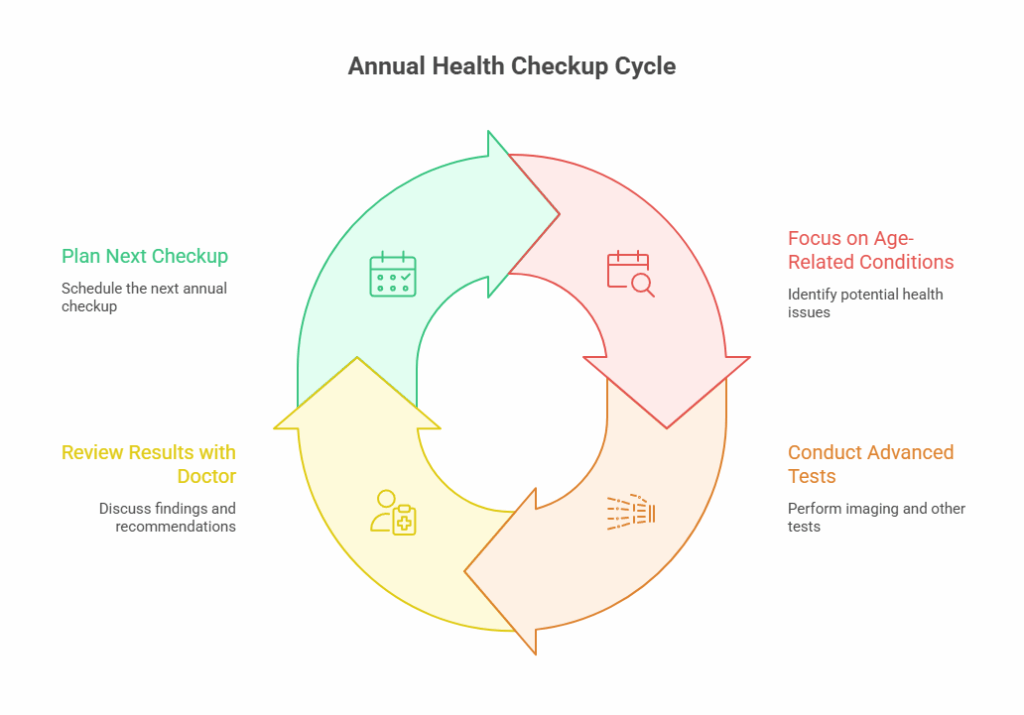
- Focus: Detailed screening for age-related conditions, cancer markers, and organ function.
- Recommended Checkup: An Advanced or Premium health checkup package that includes imaging tests like an Ultrasound of the abdomen and other tests like bone densitometry, as advised by your doctor.
- Frequency: Annually.
How to Choose a Reliable Lab: The Health Care On Time 5-Point Checklist
The accuracy of your full body checkup results depends entirely on the quality of the diagnostic lab you choose. Here’s a simple checklist to ensure you select the right one:
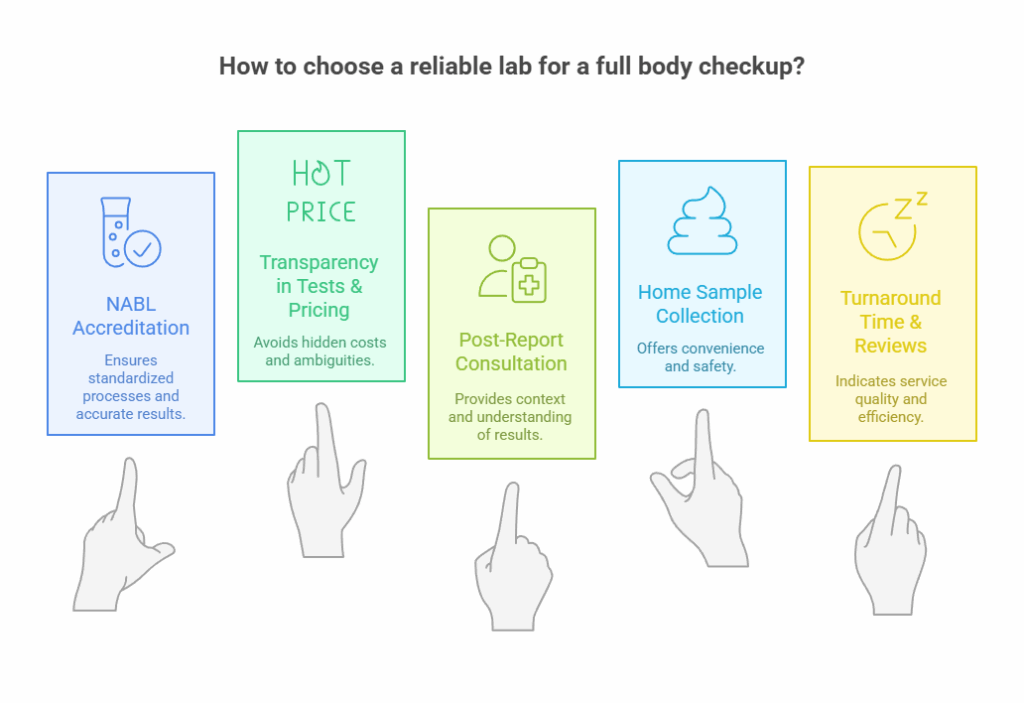
- NABL Accreditation is Non-Negotiable: The National Accreditation Board for Testing and Calibration Laboratories (NABL) is the highest standard of quality for labs in India. Always choose a NABL accredited lab. This guarantees that the processes are standardized and the results are accurate and reliable.
- Transparency in Tests & Pricing: A trustworthy lab will provide a clear list of every single test included in its health checkup packages. There should be no hidden costs or ambiguities in the full body checkup price.
- Post-Report Consultation: Many leading labs offer a complimentary post-report consultation with a doctor to help you understand your results. This is an invaluable service that adds context to the numbers.
- Home Sample Collection Service: For convenience and safety, check if the lab offers a hygienic and professional home sample collection service.
- Turnaround Time (TAT) & Reviews: Check how quickly the lab provides the reports. Reading online reviews can also give you an insight into the experiences of other customers with their service quality.
The Verdict on a Full Body Checkup
So, is a full body checkup worth it? The answer from a preventive healthcare perspective is a resounding yes. When chosen wisely and personalized to your specific needs, it is one of the most crucial investments you can make. It is not a cost, but an investment in your future health, peace of mind, and long-term financial well-being.
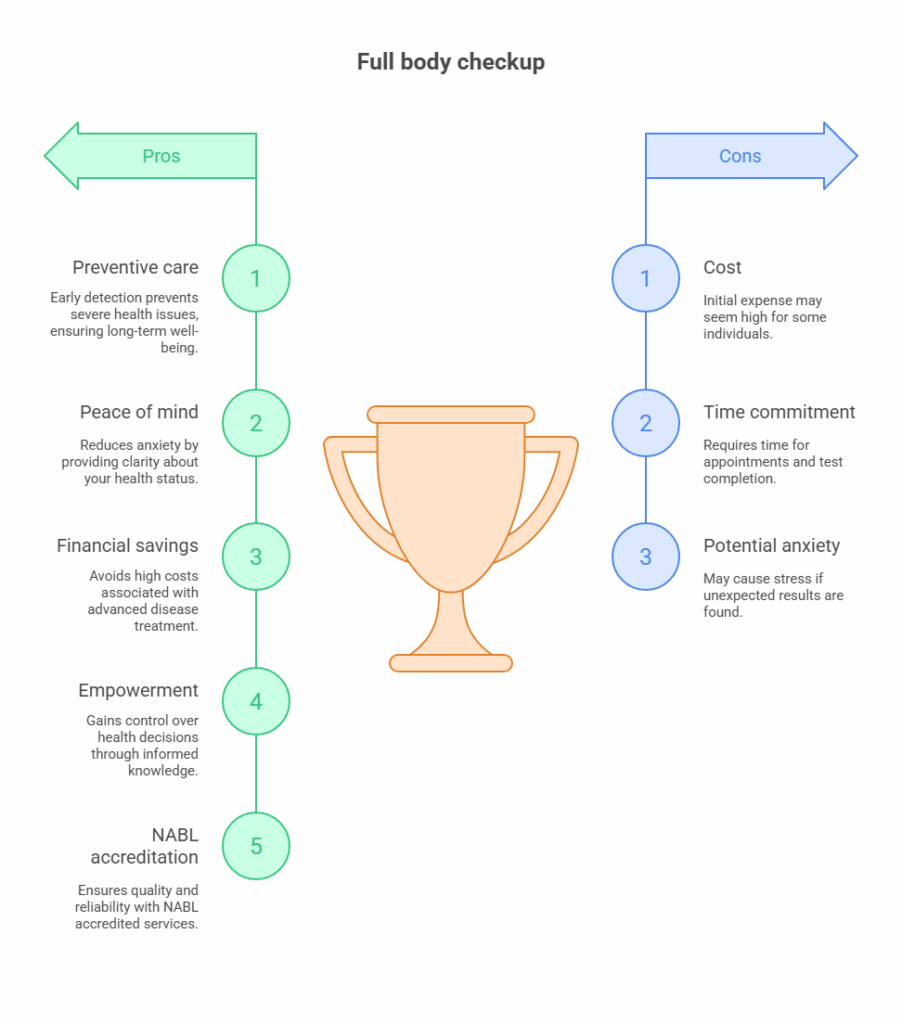
Comparing the modest full body checkup cost to the potentially astronomical expenses and emotional toll of treating an advanced disease makes the choice clear. It empowers you to move from a position of uncertainty and fear about your health to one of knowledge and control.
Ready to take control of your health? Don’t wait for symptoms to appear. Explore Health Care On Time’s range of NABL accredited health checkup packages today and book your first step towards a healthier and happier tomorrow.
Frequently Asked Questions (FAQs)
1. How often should a healthy person get a full body checkup?
For healthy individuals under 35, once every 3 years is often sufficient. For those between 35-50, every 1-2 years is recommended. For individuals over 50, an annual checkup is ideal.
2. Is fasting required before a full body checkup?
Yes, a 10-12 hour fast (no food or beverages other than water) is essential for accurate results, especially for the Blood Sugar and Lipid Profile tests.
3. What is the main difference between a basic and a comprehensive health package?
A basic package covers essential organ function (liver, kidneys) and blood counts. A comprehensive package adds crucial tests for long-term health risks, such as HbA1c for diabetes, a full thyroid panel, vitamin level checks, and often an ECG for heart health.
4. Can I use my health insurance to pay for a full body checkup?
Generally, health insurance policies in India are for hospitalization expenses. A preventive health checkup is usually paid for out-of-pocket. However, you can and should claim the tax benefit of up to ₹5,000 under the Section 80D health checkup provision.
5. Is home sample collection for a full body checkup safe and hygienic?
Yes, when done by a reputable NABL accredited lab. Phlebotomists are trained professionals who use sterile, single-use kits to ensure the process is completely safe and hygienic.
6. What should I do if my test results are abnormal?
Don’t panic. The first step is to consult with a doctor. They will interpret the results in the context of your overall health, lifestyle, and medical history and advise on the next steps, which could be lifestyle changes, further tests, or medication.
7. Are there specific tests in a full body checkup for a female that are different from a male’s?
The core tests are the same. However, age-appropriate checkups for women should include discussions about clinical breast exams, Pap smears, and mammograms, while for men, they might include a discussion about the PSA test for prostate health.
8. From what age should I start considering a yearly preventive health checkup?
While it depends on individual risk factors, starting yearly checkups from the age of 45 or 50 is a widely recommended practice for comprehensive health monitoring.
9. Can a regular full body checkup detect cancer?
A full body checkup is not a definitive tool for cancer diagnosis. However, certain abnormalities in blood counts (CBC), organ function tests, or specific tumor markers (if included) can act as red flags, prompting your doctor to recommend further specialized cancer screening tests.
10. What documents are needed to claim the Section 80D tax benefit for my checkup?
You need the receipt of payment for the preventive health checkup. Ensure the payment is made through a digital mode, cheque, or demand draft, not cash, to be eligible for the claim while filing your income tax return.








